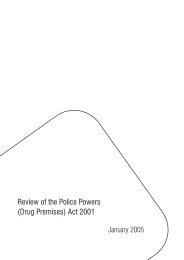Crimes (Forensic Procedures) Act 2000 - NSW Ombudsman - NSW ...
Crimes (Forensic Procedures) Act 2000 - NSW Ombudsman - NSW ...
Crimes (Forensic Procedures) Act 2000 - NSW Ombudsman - NSW ...
You also want an ePaper? Increase the reach of your titles
YUMPU automatically turns print PDFs into web optimized ePapers that Google loves.
In our view, this is not very useful. It would certainly be most unusual for a person to walk into a police station and<br />
volunteer to provide a DNA sample in the interests of law enforcement. Further, it is unlikely people would know that<br />
police would like their DNA sample to use in the investigation of an offence to which they have some connection.<br />
In case study 43, it is unlikely the people who may have contributed to the mixed DNA sample – cleaners, security<br />
officers and other people who worked at the shopping centre – would have volunteered to provide a sample unless<br />
police asked them to provide one.<br />
In its submission, Legal Aid <strong>NSW</strong> recommended changing the definition of volunteer to “a person, other than a<br />
suspect, who consents to a request by a police officer to undergo a forensic procedure.” 670 We agree that this is<br />
clearer than the current definition of a person other than a suspect “who volunteers to a police officer to undergo a<br />
forensic procedure.” We also note that the equivalent legislation in South Australia specifies that a forensic procedure<br />
can only be conducted on a volunteer if “the person on whom the procedure is carried out is not under suspicion.” 671<br />
This may also clarify that a person who is under suspicion cannot be treated as a volunteer.<br />
In our draft report, we made a provisional recommendation, that the definition of volunteer be changed to “a person<br />
who is not under suspicion, who consents to a request by a police officer to undergo a forensic procedure.” Or, in the<br />
case of a child or incapable person, “whose parent or guardian consents to a request by a police officer that the child<br />
or incapable person undergo a forensic procedure.”<br />
<strong>NSW</strong> Police did not support this change, simply commenting, “this recommendation is problematic and provides<br />
fewer clarifications in some aspects.” 672<br />
The Attorney General’s Department advised that it is currently implementing part of the recommendation. It is<br />
preparing a Bill that will “change the definition of volunteer to include the new test that the person (or parent or<br />
guardian where appropriate) consent to a request by a police officer to undergo the procedure.” However, it raised<br />
concerns about the proposal to define a volunteer as “a person who is not under suspicion”:<br />
For the reasons set out in paragraph 7.1 of the draft Report, the distinction between a suspect and volunteer is<br />
a very significant one under the <strong>Act</strong>. A person may be “under suspicion” by investigating police but may not fit<br />
the definition of “suspect” under the <strong>Act</strong>. Any definition that created a lacuna where a person might be neither<br />
a suspect nor a volunteer for the purpose of the <strong>Act</strong>, would be highly undesirable. This portion of the draft<br />
Recommendation may need to be reconsidered.<br />
As discussed in paragraph 7.1.3, the distinction between suspects and volunteers is not always clear. Whether a<br />
“person of interest” should be considered a suspect or volunteer will depend on the circumstances, in particular<br />
whether the evidence supports a reasonable suspicion that the person committed an offence. We concluded in<br />
our above discussion that in the event of uncertainty, police should err on the side of treating people of interest as<br />
volunteers. After further consideration, we agree that the definition of a volunteer should remain “a person other than<br />
a suspect” rather than “a person who is not under suspicion.” We also note here that Recommendation 11, which<br />
relates to the cautioning of volunteers, would address some of the concerns we have outlined above.<br />
Recommendation 26<br />
The definition of ‘volunteer’ in the <strong>Crimes</strong> (<strong>Forensic</strong> <strong>Procedures</strong>) <strong>Act</strong> <strong>2000</strong> be amended so that it provides<br />
words to the effect that a volunteer is a person (other than a suspect or excluded volunteer) who consents to<br />
a request by a police officer to undergo a forensic procedure, or in the case of a child or incapable person,<br />
whose parent or guardian consents to a request by a police officer that the child or incapable person undergo<br />
a forensic procedure.<br />
7.5.2. Records of consent<br />
The consent form must state the name of the person giving consent, a description of the forensic procedure, the<br />
name of the police officer who requested consent, a statement that the required information has been provided,<br />
the name of the independent person in whose presence the consent is given, and a statement indicating whether<br />
consent is given subject to a condition about which index of the DNA database, if any, the volunteer’s profile will<br />
be placed on. 673 The consent form must be signed by the volunteer, or parent or guardian where applicable.<br />
The signature must be witnessed by an independent person, who cannot be a police officer, or other person<br />
<strong>NSW</strong> <strong>Ombudsman</strong><br />
DNA sampling and other forensic procedures conducted on suspects and volunteers under the <strong>Crimes</strong> (<strong>Forensic</strong> <strong>Procedures</strong>) <strong>Act</strong> <strong>2000</strong> 119

















